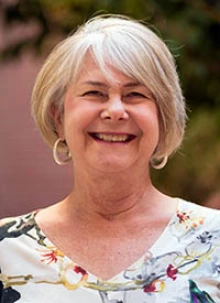UArizona Nursing Researchers Develop Web-based Skin Cancer Prevention Training for Massage Therapists
E-training helped massage therapists increase their knowledge of skin cancer and become more comfortable discussing risk reduction with clients.
Skin cancer is the most common form of cancer in the United States, where 1 in 5 people will develop skin cancer by the age of 70. University of Arizona Health Sciences researchers are studying ways to reduce skin cancer risk by developing online training for massage therapists.

Lois J Loescher, PhD, RN, FAAN, is researching how simulation-based online training courses can help massage therapists increase their knowledge of skin cancer and talk to their clients about skin cancer risks.
During a typical full body massage, massage therapists may see skin cancer risk factors such as sunburn, tanning lines, high mole counts or suspicious lesions. Because of their eyes-on-the-skin observation and client-centered communication, massage therapists are uniquely positioned to promote skin cancer risk reduction.
“Skin cancer is the most common cancer in the U.S. and costs about $8.1 billion annually to manage,” said Lois J Loescher, PhD, RN, FAAN, a professor in the UArizona College of Nursing and member of the UArizona Cancer Center. “Massage therapists trained to properly communicate skin cancer risk reduction information to their clients ultimately could contribute to decreased skin cancer incidence and management costs.”
Dr. Loescher’s team recently concluded a study, “Massage Therapists Skin Health Awareness, Referral and Education (MTsSHARE) to Reduce Skin Cancer Risk in Arizonans,” in which the massage therapists who participated significantly increased their knowledge of skin cancer and comfort in sharing risk reduction information with their clients. The results were published in the Journal of Medical Internet Research.
The e-training intervention had two purposes: to inform massage therapists about skin cancer risk reduction; and to train massage therapists how to have positive client-focused conversations about skin cancer risk reduction without compromising their scope of practice.
Clients typically see massage therapists more frequently and for longer durations than a primary care provider, and they are more likely to discuss health promotion, according to a 2002 study in the Journal of the American Board of Family Medicine.
Using DecisionSimTM, an online simulation-based learning platform, researchers developed five virtual cases, each highlighting different components of a conversation within the context of a massage client visit. Each case contained between four and seven decision points for the participant to apply knowledge.
The five cases were seamlessly integrated into an online learning system that allowed massage therapists to follow the e-training modules while the research team monitored participant status and case completion.
Eighty massage therapists practicing in Arizona participated, and a majority found the simulations useful and worth including in the training of future massage therapists.
Dr. Loescher and her team concluded that adding decision-simulation technology to e-training modules was useful to assess not only participant knowledge and skills, but also e-training content and delivery.
This practical application of simulation technology may be useful in a wide variety of health promotion and disease prevention contexts across disciplines and populations of study. For massage therapists, it could fill a gap caused by the lack of a national standard for including skin cancer education in massage therapy curricula.
Moving forward, Dr. Loescher plans on continuing to test the e-training in a larger sample of massage therapists in sunbelt states across the U.S.
This research was funded in part by the Arizona Biomedical Research Centre (#ADHS16-162518).
# # #
About the University of Arizona College of Nursing
Established in 1957, the University of Arizona College of Nursing has been transforming nursing education, research and practice to help people build better futures for more than 60 years. Consistently ranked among the best programs in the nation, the college is strengthening health care’s largest workforce and the public’s most trusted profession through its undergraduate and graduate programs, offered online and on-campus in Tucson and Phoenix. Headquartered in Tucson, Ariz., where integrative health has been pioneered, the UA College of Nursing is home to the world’s only Integrative Nursing Faculty Fellowship. With key focal strengths in integrative health, cancer prevention and survivorship, and nursing informatics, the college has more than 7,000 alumni worldwide promoting health and wellness in their workplaces and communities. For more information: nursing.arizona.edu (Follow us: Facebook | Instagram | YouTube | LinkedIn).
About the University of Arizona Health Sciences
The University of Arizona Health Sciences is the statewide leader in biomedical research and health professions training. UArizona Health Sciences includes the Colleges of Medicine (Tucson and Phoenix), Nursing, Pharmacy, and the Mel and Enid Zuckerman College of Public Health, with main campus locations in Tucson and the Phoenix Biomedical Campus in downtown Phoenix. From these vantage points, Health Sciences reaches across the state of Arizona, the greater Southwest and around the world to provide next-generation education, research and outreach. A major economic engine, Health Sciences employs nearly 5,000 people, has approximately 4,000 students and 900 faculty members, and garners $200 million in research grants and contracts annually. For more information: uahs.arizona.edu (Follow us: Facebook | Twitter | YouTube | LinkedIn | Instagram).

